

MIT launches online learning initiative. MIT Expands ‘Open’ Courses, Adds Completion Certificates. By Inside Higher Ed.
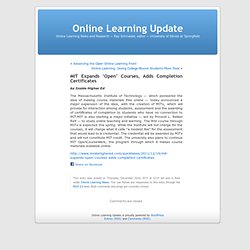
Online learning a godsend. The Jig is Up. A brief history of the impending transformation of post-secondary education, just to clarify where we are, followed by some commentary.
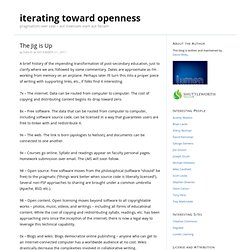
Dates are approximate as I’m working from memory on an airplane. Perhaps later I’ll turn this into a proper piece of writing with supporting links, etc., if folks find it interesting. Life in a 21st-Century English Class. Teaching Strategies Creating a Common Craft-style video is part of the classroom assignment.
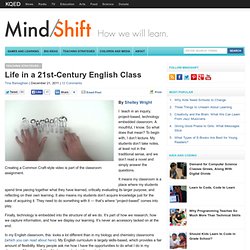
By Shelley Wright I teach in an inquiry, project-based, technology embedded classroom. Vancouver showcase of online learning innovations available on video. Quick Look: Why Scientists Need An Image Makeover. MIT up the stakes in open education. Open online courses at university level are gaining momentum. There are the MOOCs (Massive Open Online Courses) run by George Siemens, Stephen Downes, Dave Cormier and colleagues, a wide range of open courses facilitated by Peer 2 Peer University and now Stanford University's headline grabbing Artificial Intelligence course with over 50,000 students. They all offer exciting new arenas for collaborative learning and offer people a chance to participate in a stimulating and challenging learning environment.
However none of them offer full university credentials - yet. Polishing the Student’s Image on Facebook Timeline. A Tool Chain for Plotting Twitter Archive Retweet Graphs – Py, R, Gephi. From Hero to Host: Giving Up on Being "The Expert" Several weeks ago, I wrote a post on social artistry, on how I am shifting my understanding of what I do and how I do it, seeing myself more and more as a "social artist.
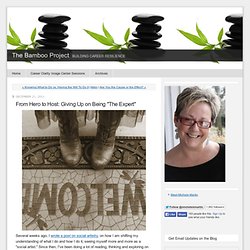
" Since then, I've been doing a lot of reading, thinking and exploring on the concept, particularly on how we can better use conversations for learning and to dig into the meaningful issues that we aren't addressing right now. This has opened up a whole new world for me and how I think about the work that I do. Warming up for the Citizens' Initiative. Editing Images with PowerPoint.
Meritocracy, Family and Education. In "The rise of meritocracy", Young explains how 'the cult of the child' took over from social class as being the most significant driving force behind educational and professional success.
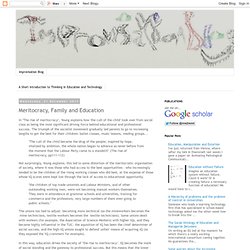
The triumph of the socialist movement gradually led parents to go to increasing lengths to get the best for their children: ballet classes, music lessons, reading groups... "The cult of the child became the drug of the people; inspired by hope, vitalized by ambition, the whole nation began to advance as never before from the moment that the Labour Party came to a standstill" (The rise of meritocracy, pp111-112) Not surprisingly, Young explains, this led to some distortion of the meritocratic organisation of society, where it was those who had access to the best opportunities - who increasingly tended to be the children of the rising working classes who did best, at the expense of those whose IQ scores were kept low through the lack of access to educational opportunity. His reason is that. Musability. This morning I read a short item from Mashable describing some predictions being made for the next five year by IBM.
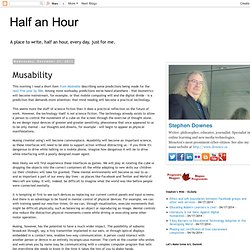
Among more workaday predictions we've heard elsewhere - that biometrics will become mainstream, for example, or that mobile computing will end the digital divide - is a prediction that demands more attention: that mind reading will become a practical technology. This seems more the stuff of science fiction than it does a practical reflection on the future of work. However, the technology itself is not science fiction. The technology already exists to allow a person to control the movement of a cube on the screen through the exercise of thought alone. As we design input devices of greater and greater sensitivity, phenomena that once appeared to us to be only mental - our thoughts and dreams, for example - will begin to appear as physical manifestations.
Musing ('mental using') will become commonplace. Learning Problems and Consultation Based Curricula. (This is a jumble of snippets in no particular order for a post that I’m not going to get round to writing…) Ewan McIntosh’s presentation at TEDxLondon: The Problem Finders [VIDEO] All our students, their parents and the people teaching them, have been indoctrinated that is teachers who sift through all the things we can learn, find the areas worth exploring, and make up theoretical problems for students to solve.
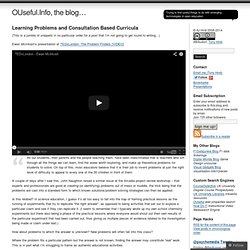
On top of this, most educators believe that it is their job to invent problems at just the right level of difficulty to appeal to every one of the 30 children in front of them. A couple of days after I saw this, John Naughton raised a similar issue at the Arcadia project review workshop – that experts and professionals are good at creating (or identifying) problems out of mess or muddle, the trick being that the problems are cast into a standard form to which known solutions/problem solving strategies can then be applied. EIT ICT Labs Master School: apply online! In the fall of 2012 EIT ICT Labs Master School will be able to welcome its first students (approximately 200).
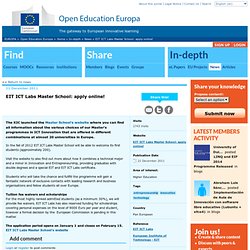
Visit the website to also find out more about how it combines a technical major and a minor in Innovation and Entrepreneurship, providing graduates with double degrees and a special EIT and EIT ICT Labs certificate. A Refreshing Take on User Experience Design. Study finds Spanish gender gap in Internet use and frequency. Compared with the average of all 31 nations, Spanish men rank 17th and Spanish women rank 19th.
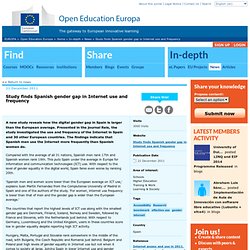
This puts Spain under the average in Europe for information and communication technologies (ICT) use. With respect to the level of gender equality in the digital world, Spain fares even worse by ranking 20th. 'Spanish men and women score lower than the European average on ICT use,' explains Juan Martín Fernandez from the Complutense University of Madrid in Spain and one of the authors of the study. 'For women, internet use frequency is lower than that of men and the gender gap is wider than the European average.' The countries that report the highest levels of ICT use along with the smallest gender gap are Denmark, Finland, Iceland, Norway and Sweden, followed by France and Slovenia, with the Netherlands just behind. Hungary, Malta, Portugal and Slovakia rank somewhere in the middle of the road, with Bulgaria, the Czech Republic and Romania just behind. For more information, please visit: Reis: Clive on Learning.
New ways to distribute content: part 3. Whichever format you choose for your content, you need a way to make this accessible to learners.

As ever, there are plenty of options: IRRODL call for papers: Technology Enhanced Information Retrieval for Online Learning. Online learning classrooms: More teachers ride virtual circuit. By Kay Luna, Quad Cities Times English teacher Sean Chapman is coaching his high school students, helping them narrow down their research paper topics. “I picked Ansel Adams,” one student offers. “OK,” 47-year-old Chapman replies, pausing for a beat. Online Classes Accelerate Math for Middle Schoolers, Research Finds.
By Dian Schaffhauser, THE Journal Eighth-graders who take an online Algebra I course score higher on end-of-year algebra assessments than other students who take the standard instructor-led math program offered by their schools and are twice as likely to follow an advanced course sequence in high school as their peers. Those results came out of a multi-year study done in 68 mostly rural schools in Maine and Vermont and could influence decisions by more middle schools to begin offering Algebra I classes. Advancing the Open Online Learning Front. Conference: Closing the generation gap, EDEN, Portugal, 2012.
Francophone colloque/conference in Montreal, 3-4 May, 2011. Building a knowledge economy through Telecentres in Africa. 5 E-Learning Forecasts for 2012. Freakonomics: What Went Wrong? Examination of a very popular popular-statistics series reveals avoidable errors. Warming up for the Citizens' Initiative. Books and Band Saws: the Future of Libraries. Culture Teaching Strategies. Warming up for the Citizens' Initiative. Adobe Captivate: Nudge the Screen Area. Catholic School Clamps Down on Kids Using Facebook. Culture. Building the future. Authentic & situated learning with mobile computing devices. Authentic & situated learning with mobile computing devices. Knowing What to Do vs. Having the Will To Do It.
The learning cycle and the power of asynchronous learning activities. Digital Learning, Education, eLearning, Improve Learning, Mobile Learning. Winning Student Presentation at CAC. Is Design Thinking Missing From ADDIE? UNESCO Launches Global Portal to Track Open Access. Curating Information & Making Sense of Data Is a Key Skill for the Future [Research] Clive on Learning. LMS – Before the Launch – 2. Gesture control. CNIE conference, Canmore, Alberta, 2012. MITx – Continuing Education online? Quick Look: The Top 10 tech trends for 2012. Online Learning Algebra Course Leads to Higher Achievement. M.I.T. Expands Its Free Online Courses to Online Learning Certificates. Tools and technologies ’spur on the success of online learning’ Quick Look: Online Interactions Between Teachers and Students. Writing and Grammar: More on Lists, Bullets, and Tufte. Clive Thompson on the Future of Printed Books. Big developments in e-books. Tune Your Feeds…
MIT Now Granting Official Certificates For Their Free Online Courses. How to undermine Facebook. The Trouble with Gifting an E-Book. Galactic Zappers. Fachforum "Free Your Lecture! Mit digitalen Medien Freiräume in der Lehre schaffen." Three Ways to Create Your Own Job. Fachforum "Free Your Lecture! Mit digitalen Medien Freiräume in der Lehre schaffen."
The E-learning Conceptual Framework. Crowdsourced Predictions for Your 2012 Education Strategy. Head of gold, feet of clay: The online learning paradox. € 5.7 billion for Marie Curie Actions under Horizon 2020. € 5.7 billion for Marie Curie Actions under Horizon 2020. Merry Textmas, Everyone – a seasonal pastiche. Future skills. Play the ball, not the man. Open Online Learning CourseWare 2.0. Top seven black swans for education in 2012. Giving College-Bound Students More Tools. The Future of Education: Online and Blended Learning. Entrevista – Práticas Pedagógicas em eLearning.